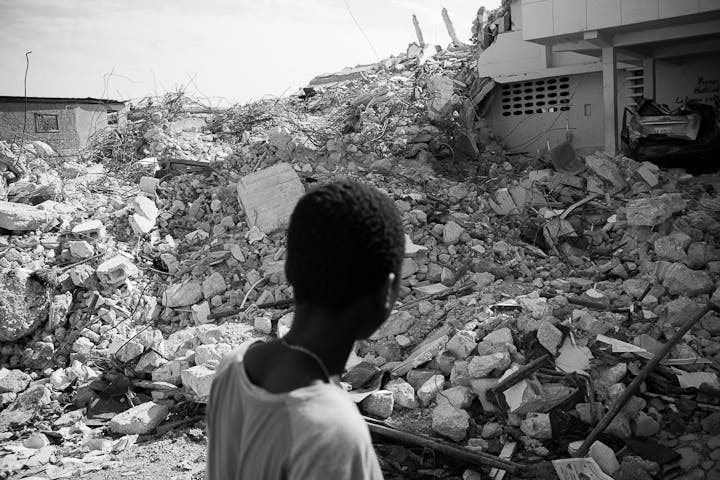Haiti: Non-random Acts of Kindness
Jan 21, 2015
Story


My 85-year-old mother left a message on my phone right after the earthquake. “I’ve found 44 baskets around the house and wonder if you can help get them to Haiti. They’re so pretty, and I think they would be good for people to keep their belongings in.”
Expressions of kindness and care toward Haiti are everywhere. Haiti has been an active part of my mother’s life for a long time, but for so many wanting to help, the motivation is simply that their fellow citizens of the world need support. I learn about these people and their big hearts all day long from my email inbox, where folks I’ve never met write to ask for advice on how they can be of use.
My mother’s gesture was so touching, I hated to have to call her back and tell her that, actually, every inch of space not dedicated to transporting U.S. soldiers and guns to Haiti was needed to get in water, food, medical supplies, tents, and tarpaulins. Later, I said. Later we’ll see about the 44 baskets.
For now, the message is money. That is, unless you have a way to get in medical aid or tents, or unless you have a direct connection with a group that needs what you have – say, an eye clinic in the slums that can put your 300 pairs of glasses to excellent use. Otherwise, please don’t send clothes, shoes, or household items. Many of these goods are just feeding a booming sidewalk sale by people desperate for money. And don’t send food. This may seem counter-intuitive given how hungry Haitians are, but peasants are striving to shore up their agricultural production, both to support themselves and to keep the nation’s food sovereign. Most of the food now being sent is not getting to those in need, anyway.
Send money. Cash is critical and, in the hand of a trustworthy organization with deep roots in Haiti, will go far in alleviating need. Moreover, as Robert Naiman of Just Foreign Policy writes, “If your aid dollar is used to purchase supplies produced in Haiti, it's doing double duty. And if it's being used to employ Haitians, it's doing triple duty. You want to push your aid dollar as close to the ground as you can.”
As for where you give that cash, I suggest you not give it to the large international non-profit organizations. At least one study by Grantmakers without Borders found that those institutions are not nearly as effective as grassroots organizations in delivering aid and much-needed services.
Your very best bet is to give to organizations that will support grassroots communities as they rebuild - in ways decided by and led by them, in ways from which they will benefit, and in ways that contribute to a more just future. There are many, but a few I recommend are:
- Platform to Advocate Alternative Development in Haiti (PAPDA), a coalition of nine Haitian organizations which is at the cutting-edge of the economic justice movement. PAPDA works for systemic economic alternatives by educating and mobilizing the grassroots, and by pressuring the government and international institutions. Today their focus is on helping social movements engage effectively in rebuilding. For more information, see the Grassroots International website and www.papda.org. To donate, go to the Grassroots International donation page. Though the site does not let you specify where your donation will go, Grassroots is tracking and will insure that it gets to PAPDA.
- Commission of Women Victim-to-Victim (KOFAVIV), a group of child slavery and rape survivors who defend the rights of women and their children. Their work has taken on new dimensions with the spiraling violence against those now living in the streets and refugee camps. From their own position in the camps (as all the members lost their houses), KOFAVIV is intervening in cases of rape and violence, helping rape survivors get care, and protecting children at risk of forced labor and prostitution. For more information, see
the Other Worlds website. To donate online, visit the website of our fiscal sponsor, the Institute for Policy Studies. Please write 'OW-HAITI' when asked which project you want to support. - Workers’ Battle (Batay Ouvriyè), a group of factory workers and allies mobilizing for a living wage and labor rights. Workers’ Battle engages in public education, media work, government pressure, and movement-building for justice for workers and against a sweatshop-led development model. For more information, go to their website. To donate online, go to this page
- The Lambi Fund of Haiti, which strengthens community-based organizations that promote democracy and economic empowerment. Since the earthquake, the Lambi Fund has been financing forty rural peasant associations to help them care for survivors who have fled Port-au-Prince. In the medium-term, the Lambi Fund will focus on reinforcing agricultural production so farmers can reclaim their livelihoods. www.lambifund.org
One of the greatest ways you can help Haitians is to promote policies that increase their chance to rebuild with equity and to live in peace. One way, acting to cancel Haiti’s $1.051 billion foreign debt, takes only a click on your keyboard. (Part of this debt is from a $100 million loan the IMF made to Haiti just after the quake. After the IMF received significant pressure to convert the loan to a grant, its board met and insisted that no, the country-in-rubble has to repay the funds.) A bill currently in the House of Representatives would require the U.S. Treasury to “use the voice, vote, and influence of the United States in multilateral financial institutions” to: cancel all remaining debts owed by Haiti to these institutions; declare a moratorium on paying on these debts until they are officially canceled; and provide additional aid to Haiti in the form of grants so that the country is not burdened with new debts. Please click on this link to ask your representative to cosponsor the bill.
And here is a message for you from your co-citizens of the world. Day after day, on the streets and in the fields, Haitians tell me variants of this: “Please let the American people how much we appreciate their outpouring of care. We are all moved by the enormous support, solidarity, and concern they’ve shown, letting us know we’re not alone in this crisis.”
As the IMF maintains its grip on Haiti’s economy, as the U.S. government’s response remains more military than humanitarian, and as multinational corporations negotiate for their contracts, I have a wish. It is that these powers shared the same humane tendencies that people across the planet have been displaying. Compared to the militarism, profiteering, and debt racketeering, my mother’s 44 pretty baskets and the love behind them look like essential gifts for Haiti.
Beverly Bell has worked with Haitian social movements for over 30 years. She is also author of the book Walking on Fire: Haitian Women's Stories of Survival and Resistance. She coordinates Other Worlds, www.otherworldsarepossible.org, which promotes social and economic alternatives. She is also associate fellow of the Institute for Policy Studies.




